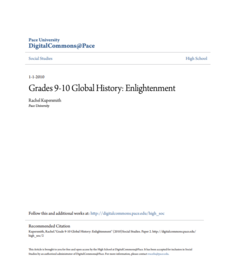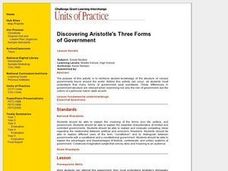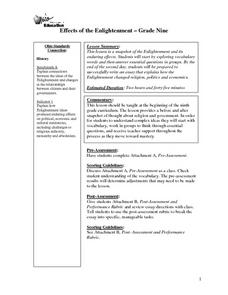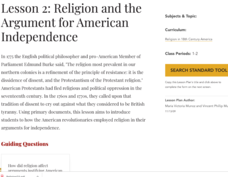Curated OER
Marie Antoinette: The Tragic Queen
Students view a documentary on Marie Antoinette, who became a symbol of the reviled monarchy. After viewing, students discuss what they saw then create a family line of Marie Antoinette. They compare maps of Europe from her time to ours.
Pace University
Global History: Enlightenment
The core ideas of the Enlightenment—reason, knowledge, and freedom—represented a rebellion against the despotic control of absolute monarchs. As part of the study of the movement, class members assume the voice or either a monarch or an...
Curated OER
Discovering Aristotle's Three Forms
Students, working in small groups, role play different kinds of governments--oligarchy, monarchy, dictatorship, and democratic republic. They portray their form of government in a skit, while other groups guess which kind of government...
Curated OER
We Choose Our Own
In this governments worksheet, students fill in a chart for how leaders rule in a monarchy, dictatorship, and republic. Students also complete 3 short answer questions.
Curated OER
Effects of the Enlightenment
Ninth graders explore the Enlightenment and its historical effects. As a class, they discuss the characteristics of kings, queens and monarchies. Pupils design political cartoons to illustrate vocabulary words. Using a graphic...
Curated OER
Citizen Me
Fifth graders examine what it means to be a citizen. Using the Constitution, they discover the functions and purpose of government. They compare and contrast the difference between a democracy and a monarchy. As a class, they discuss...
Curated OER
The Constitution: the Head of State
Students participate in a constitutional convention to debate whether Australia should become a republic. They form small groups to represent various sides of the debate such as parliamentary republicanism, popular republicanism and...
Curated OER
Politics: From Royalty to Democracy
Students explore forms of government in the Middle East. In this government systems lesson, students watch videos, listen to lectures, and explore websites regarding the forms of government in the Middle East
Curated OER
Royal Role Models
Learners explore the Royal Family. Through reading news stories and research, studenets discover the function of the British monarchy. They discuss how the Royal Family should be expected to behave as role models.
Curated OER
Producing a concept map for governance of countries in the EU
Students explore, examine and study the terminology associated with governance and discover the types of governance within each EU country. They produce a mind map that concentrates on UK government and monarchy and critique the...
Curated OER
The Queen's Birthday
Students read and discuss an article about England's Queen Elizabeth's birthday party. They work in small groups, complete vocabulary exercises and take a comprehension quiz.
Curated OER
Lesson: Storyboarding Revolution
Kids consider revolution as a basis for creativity, art, and storytelling. After reading an excerpt from the book, Persepolis, learners choose one event from any world revolution to write about. They storyboard the event focusing on...
Curated OER
What Experiences Shaped the Founders' Thinking about Government?
Students study the ideas and experiences that shaped the founding fathers' perspective about government. In this the government lesson plan, students examine the Articles of Confederation as they relate to the power of government....
Curated OER
Creating a Government
A simulation gives scholars a personal look at what goes into forming a government. Each of them is assigned 1 of 4 tribes which make up Borka, a hypothetical country. The tribe distribution is based on the percentage of people in each....
Curated OER
The War in the South, 1778-1781
Young scholars explore the major terms of the Franco-American alliance and their importance to the cause of independence. The most important military engagements in the South are discussed and their significance for the outcome of the...
National Endowment for the Humanities
Lesson 2: Religion and the Argument for American Independence
Young scholars examine how religion affected arguments justifying American independence. They read and analyze primary source documents, and write an essay analyzing how Americans used religious arguments to justify revolution against a...
National Endowment for the Humanities
The War in the South, 1778–1781
The second in a three-part look at the Revolutionary War focuses the years from 1778 through 1781 and zooms in on military operations in the southern colonies, the French alliance, and the role African-Americans played in events. Class...
Facing History and Ourselves
The Weimar Republic: Historical Context and Decision Making
Did you know that way before Hitler became a dictator, he actually spent nine months in a German jail? Provide the background for the escalating point before the Nazi party took over in World War II through the exercises in the resource....
Curated OER
Introduction to Age of Absolutism
Who were the absolute monarchs of Europe and what effect did they have on their countries? Young historians begin by naming qualities they believe are important for a monarch to possess. They then take notes on four key factors leading...
Curated OER
The Importance of Representative Democracy
Students examine the general concept of representative democracy, and compare/contrast the American representative democracy to the monarchical system. They research the role of legislative bodies in serving the government, particularly...
Curated OER
The French Revolution
Students understand the basic political events of the French Revolution, broken down into four stages, and the shifts of power during each stage. They examine how the members of the Third Estate gained not only political but also...
National Endowment for the Humanities
The President Under the Articles of Confederation
The Articles of Confederation sounds like one big, fancy title to middle schoolers. Here, scaffolded steps help to ease novices into understanding this all-important American document. Discussion questions, lesson plan activities, and...
Curated OER
League of Nations
Ninth graders examine the purposes and mandate system of the League of Nations. They watch a PowerPoint presentation on the mandate system and complete a fill-in-the-blank worksheet, and participate in a "pick your side" activity.
Curated OER
Representation: Elections
Students study and examine how elections are conducted in Australia. In this representation lesson plan, students make comparisons regarding systems of voting. Students explore the three levels of government and discuss federal...
Other popular searches
- Absolute Monarchy
- European History Monarchy
- Constitutional Monarchy
- English Monarchy
- Oligarchy Democracy Monarchy
- History Absolute Monarchy
- Elizabethan Monarchy
- British Monarchy
- Charles v Monarchy
- French Monarchy
- Monarchy Oligarchy
- 3 Absolute Monarchy

























